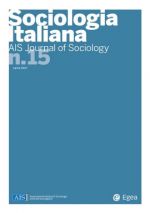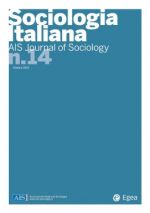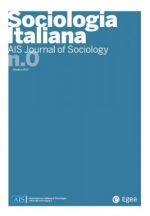Ricerca
Filtri applicati:
Raffina la ricerca
- Parola chiave
- Herbert Blumer (1)
- Renate Siebert (1)
- Area di conoscenza
- Teorie sociologiche e trasformazioni sociali (9)
- Sociologia della religione (2)
- Tipo contenuto
- Articolo di rivista (24)
- Intervista (2)
- Lingua
- Inglese (2)

La norma tecnica UNI 11695:2017: opportunità e sfide per la professione di sociologo (The technical standard UNI 11695:2017: opportunities and challenges for the sociological profession), di L. Benvenuti, C. Bruni, P. Magnante, A. Perino
L’articolo, a partire dalla descrizione della situazione in cui attualmente versa la professione del sociologo, si propone di delineare le opportunità offerte dalla norma tecnica UNI 11695 del 2017. Dopo aver delineato il quadro nell’ambito del quale si è realizzata la costruzione della suddetta norma, saranno esaminate le opportunità offerte – ai professionisti e alle associazioni – dalla ...

La sottile linea d’ombra. Aspetti etici nell’uso dello shadowing nella ricerca sociale (The thin shadow line. Ethical aspects in the use of shadowing in social research), di Alice Scavarda
L’articolo illustra alcune questioni etiche relative all’uso dello shadowing nella ricerca sociale. Nonostante sia piuttosto utilizzato nelle scienze sociali, lo shadowing ha ricevuto scarsa attenzione metodologica finora. Ciò stupisce in relazione al fatto che il metodo implica un’osservazione duratura e intrusiva, che presenta numerose implicazioni etiche, definite «etica pratica». Quest’ultima ...

Imbalancing the academy: the impact of research quality assessment, di Ian McNay
Introduction It is thirty years since the first national approach to assessing research quality in a university system was introduced. The pioneer was the United Kingdom, in 1986, within a context where the Thatcher government had an agenda of «value for money» in public services, of containing the autonomy claimed by professionals, and increasing the accountability for the use of public funds. ...

German universities on their way to performance-based management of research portfolios, di Jochen Gläser
Introduction I am indebted to Uwe Schimank for helpful comments. The rise of «new public management» (NPM) in higher education systems of many OECD countries is based on, and fuels, research evaluation as a political and management tool. Central tenets of NPM – that competition increases efficiency, that resources need to be allocated to the best-performing units, and that hierarchical management ...

The fates of social science journals in languages other than English: key issues for research communities and editorial policies, by M. Fernández-Esquinas
Introduction Scientific journals have been undergoing an important transformation fort the last two decades. Some of the main changes affecting them have been driven by digitisation, the globalisation of the publishing market, the emergence of metrics and the use of journals in research evaluation and science policy (Mackenzie 2007; Larivière et al. 2015; Moed 2006; Malsch and Tessier 2015). ...

Grounded Theory, Sensitizing Concepts, and Computer-Assisted Theory Building, di Roberto Cipriani
Introduction The presence of many – sometimes contradictory – theories is arguably considered a strength in the social sciences. The multitude of available theories today makes it seem impossible to have a grand theory, a specific unique theory that may be applied to all situations at all times in order to explain social phenomena. Therefore another solution becomes more and more reliable: ...